"I'm pretty confident in my ability to be a good manager, but a lot of it is instinct...I'm not sure I can teach that to others."
Sound like something you'd say?
Many of the senior leaders I've spoken to find that they face a whole new set of challenges when they become a manager of managers.

The day you became a manager was the day you took up a new profession: leadership.
Becoming a senior leader who leads other managers is the next stage of evolution on that leadership journey. Now, you have to think about...
How to make other managers successful, too
Maybe you're a newly minted senior leader, suddenly finding your team got too big and you had to promote your first managers to help you.
Or, maybe you've had a team of managers for a while and realize you need to be a lot more intentional about both what you do and what you teach your managers.
Either way, you need to learn how to make the transition from a manager of individual contributors to a great builder and manager of other managers.
Developing future leaders, coaching your new managers to be good leaders to their teams, and molding your team and company's culture are all things you need to invest time in as a senior leader. You're a multiplier, after all.
Today, we take a deep dive into those and other areas to look at what skills you need to master to be a great senior leader. We'll show you what it takes to be a manager of managers and how to level up your areas of weakness.
Table of Contents:
- Intro: What is a senior leadership role and why would you become one?
- Part 1: Key habits and concepts to be a great manager of managers
- Part 2: Developing leaders to scale your leadership
- Part 3: Mastering the fundamentals and other tips
- Part 4: Creating a great culture for your organization
- Bonus point: Plan for the unexpected (Crisis leadership and COVID)
- Resources for developing new leaders (and senior leaders)
- Additional resources and further reading

Intro: What is a senior leadership role?
Senior leaders oversee the work of other managers - their direct reports - and their teams.
As Glassdoor puts it, they’re responsible for the following things:
“Senior leaders steer core initiatives and establish organization-wide policies and standards. They lead strategic planning and critical decision-making. They select and oversee directors and managers. They manage budgets, approve major expenditures, and maintain important strategic partnerships. They may also serve as a public “face” representing the company and making official statements.”
If you aim to keep developing as a manager throughout your career, becoming a senior leader is an inevitable step on your path.
All of this means that senior leaders have a more strategic role. As they have other managers report to them, they provide high-level leadership and direction for their department or organization. They are in charge of setting and achieving these high level goals by leveraging the teams that are below them in their org chart.
Why would you want to become a senior leader?
Becoming a senior leader is a rewarding and exciting role for several reasons, including:
- Being one of the most trusted employees of your company
- Directly executing and influencing the vision of a company or department and managing its performance along with other senior leaders
- Overseeing the development of other managers and leaders
- Increased impact, responsibility, and compensation. Often, it can come with a significant ownership stake or profit-sharing depending on your company and role.
Jeremy Brown, the CTO of Ocus, talked to us about one of his biggest achievements as a senior leader:
"Maybe it was a bit of luck, but every person at Traveldoo showed growth during my time there. Even if it was slow and took a lot of effort to happen, everyone made progress.
Seeing that growth in somebody has been the most rewarding part of my job. And Lighthouse is a big part of that story.”
Being a senior leader can be very lucrative. On average, senior leaders in the US earn an annual salary of $177,585.
As great as all of this sounds, being a senior manager does come with some important caveats.
These roles come with lots of responsibilities which means you can sometimes face issues like burnout. According to a 2021 survey by DDI World, almost 60% of leaders reported feeling worn out at the end of each day. The same survey found that 44% of leaders who feel overworked plan to move to a new company in order to advance their careers.
You’re also often in the spotlight more; the example you set is seen and followed by those in your part of the org chart, and the ultimate success and failure of projects and initiatives will be your responsibility. There’s no room to point fingers when you’re a senior leader.
Despite that, developing into a senior leader can open plenty of exciting opportunities for you. Here are some key habits and concepts you need to develop to become one.

Part 1: Tips for Senior Leaders and Senior Leadership Roles (Key habits and concepts to be a great manager of managers)
What are the most important skills for senior leaders to develop?
There's a lot that goes into being a great leader who develops and leads other managers, but there are certain things that are of critical importance for you to learn.
Here are some of the most important of those habits and concepts senior leaders need to develop:
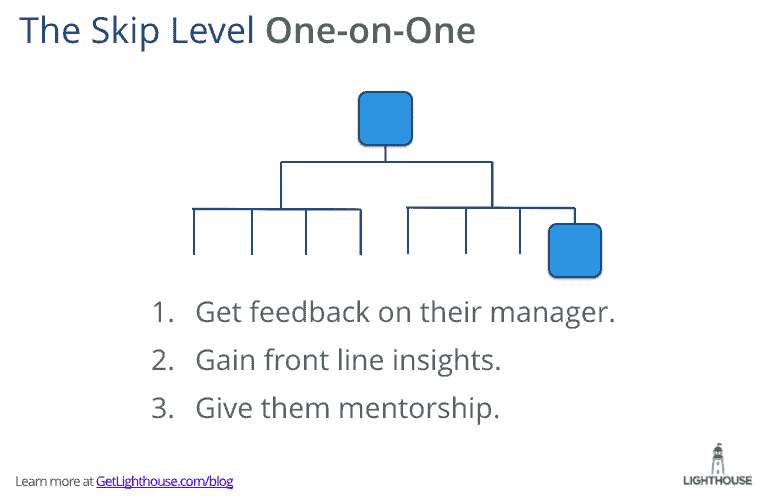
1) Master skip level one on ones
If you've been following the Lighthouse blog for any length of time, you probably already know how important one on ones are.
What you might not realize is that one on ones with your new managers don't end. In fact, they're more important than ever. When your managers take on new responsibilities, they need more of your hands-on support and guidance (more on this later).
However, those aren't the only one on ones you'll be doing.
Skip level one on ones are also very important and valuable. They give you the ability to gain insights from those further down your growing org chart that you might not otherwise have uncovered.
It also gives you the chance to:
- Find out how your manager is doing, including areas they might need help or coaching
- Recognize macro behaviors and patterns across teams for both what's working and what needs improved
- Notice how your org's culture is forming or changing
- Get insights from front line employees who interact with customers and day to day work that you are more and more distant from
To learn more about skip level one on one meetings and the steps necessary to start them with your team, read our post about skip level meetings.
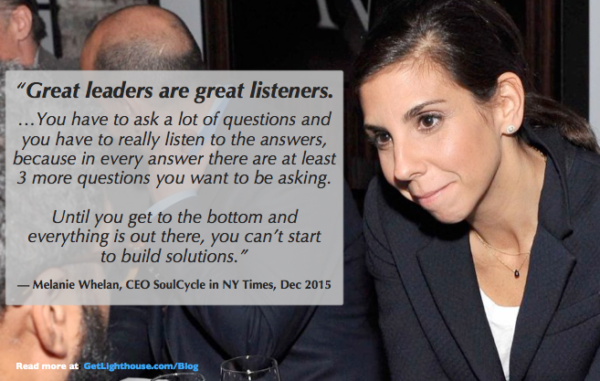
2) Become great at asking questions (and listening)
Hopefully, you have gotten lots of practice as a manager asking questions and listening to your team and others.
Being great at asking the right questions and listening effectively becomes even more important when you're a senior leader. Your ability as a multiplier is now magnified several times, and what you can do is often only limited by what you know (or don't know) is happening.
You can only identify problems to fix, and find great opportunities, if you know they exist. And the more senior you get, the more you have to work hard to find them; your rank and stature in your company can intimidate people, which means they won't volunteer every bit of information that would help you, especially if it's bad news.
This means being great at asking questions becomes a critical skill to master. The right question can reveal exactly what you need to know.
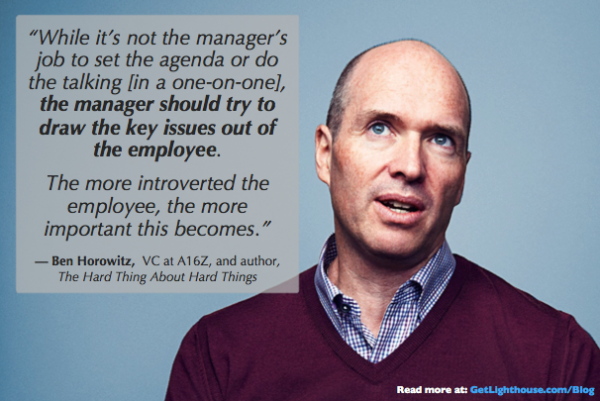
Learn new tricks.
You probably have some favorite questions you like to ask in one on ones and some ways you prefer to dig into and uncover issues. It's always good to have reliable standby questions, but with a new position comes new questions, challenges, and conversations.
Not only is the power dynamic different in your skip level meetings, you will also want to learn different things depending on your position and that of the person you're talking with.
No longer are you only worried about your direct team's production. Instead, you also have to think cross-functionally, and at scale.
You're looking for patterns, opportunities, and problems often across teams.
These require new questions and approaches.
Here are a few examples of questions you should try:
- For building rapport quickly and comfortably:
- What made you decide to join our company? What were you most excited about when you started?
- What's your favorite book you've read / podcast you've listened to / movie you saw recently?
- What made you decide to become a(n) [engineer/marketer/sales person/customer success/role]?
- Obtaining feedback about how their manager is doing:
- Do you feel you're getting enough feedback from your manager? Why/Why not?
- When was the last time you had a conversation with your manager about your career? How did it go?
- And for giving praise and recognizing the best in your org:
- Who is an unsung hero in our company? What do they do that deserves recognition?
- Has anyone gone well above and beyond lately? What did they do?
- Do you feel we properly recognize people here? Why / why not?
Asking questions like these will help give you insights and perspective into all the work you know is happening, but don't see as much.
Remember: While your day may now be filled with wall-to-wall meetings, and un-glamorous work of mid-level leadership, those in your department are doing key, hard work to move your product forward, launch new features, close sales deals, tackle tech debt, and promptly resolve support issues.
The best thing you can do is ask them great questions to understand this world you don't see every day. Because a simple "how's it going?" will not cut it.
You have to level up your question-asking skills as you rise in your organization so you get the insights you need within the time constraints you have to invest with someone. All of this then has to happen while you also create psychological safety, so they feel comfortable answering you.
Further reading:
- For your Skip Level 1 on 1s, ask these questions: 66 Skip Level Meeting Questions to Improve Your Managers and Engage Your Employee
- And as you continue 1 on 1s with the managers that report to you, ask these: 96 Questions to ask in one on ones with a manager
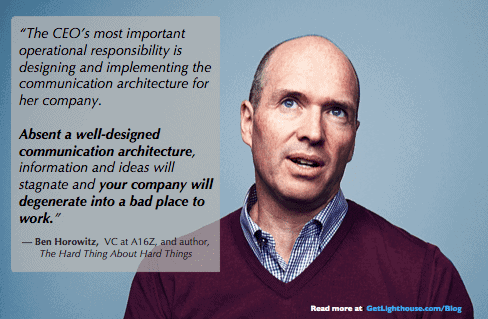
3) Study and improve your organizational communication
As Andy Grove puts it in the leadership classic, High Output Management:
"The work of a business, or a government bureaucracy, or most forms of human activity, is something pursued not by individuals but by teams.”
Without effective communication, your team will break down. Without a doubt, it's the single most important element of any team, and it becomes exponentially more important the larger the team gets.
However, there's more to effective communication than just passing on information. As a leader, you need to present that information in a way that encourages action.
As Todd Lutwak of Andreesen Horowitz wrote:
"Awareness ≠ Understanding
Understanding ≠ Acceptance
Acceptance ≠ Implementation”
Learning how to convey messages that people can truly understand and act on is a major skill to develop. It's very different from talking directly to a small team as you would as a manager of ICs.
- To learn more about setting up effective organizational communication in your department or company, read everything you need to know about organizational communication from the experts.

Part 2: Developing leaders
A key part of being a great senior leader is learning how to effectively identify candidates for future leadership positions and develop them into leaders.
A healthy pipeline of leaders ensures that your company avoids the Peter Principle and teams struggling because of ill-prepared, and poorly selected managers.
That doesn't happen by accident. Developing leaders requires your attention and effort:
- Before someone is promoted: Picking the right people, and guiding them toward the right materials and activities to help them develop their leadership skills.
- After they're promoted: Coaching them as they learn and make mistakes with their team, and supporting them to thrive with their new responsibilities.
Here are a few key tips to help you in developing your leaders:

4) Promote the right people
The most important choice you make as a senior leader is who you promote. It signals to your organization what you reward and want to see more of. It also determines how teams will perform, because people leave managers, not companies.
The question then becomes: What should you be looking for when identifying people to promote to leadership positions?
It's important not to promote someone just because they're a good individual contributor (IC); that often has little to do with whether they'll make a good leader.
The responsibilities and day-to-day for a manager are focused on people, meetings, and processes, while ICs are writing code, interviewing customers, updating designs, answering support tickets, and closing sales. It's perfectly normal to have aptitude and interest in the IC activities and none for the manager's responsibilities.
If IC performance isn't a good indicator, what do you look for? Instead, you want to look for qualities like:
- Empathy for others: Someone won't make a great leader if they're only ever thinking about themselves and have low emotional intelligence.
- Being a good listener: Listening is one of the most important skills of an effective leader. Yet, it is a challenging skill for many to learn who love sharing their ideas, but rarely ask for the input of others.
- Showing consistency and accountability: You need to be able to count on your leaders (and their teams do, too), so they need to be consistent and accountable people.
To learn more about who you should promote, including 2 additional qualities you should look for, read:

5) Promote from within
Another factor to think about is whether you should promote from within or hire managers and leaders from outside your company.
Your first thought may be that hiring outside leaders is a good approach. They already have the skills you want, and so you won't have to spend as much time on training, right? Wrong.
The problem with promoting from outside is that it doesn't usually work out as you would imagine. According to a Wharton management study by Professor Matthew Bidwell, external hires tend to have both significantly lower performance evaluations for the first two years, while also having higher rates of quitting.
Compounding things, they are also more expensive, as they're typically paid around 20% more.
Why does this happen? Well, it turns out assimilating into a culture is harder than you may think. A great manager at another company may have no idea how to persuade or get anything done at your company. They may even approach things in a way that turns off your team due to different work styles.
As much as you may hope that your interview process can screen for some of this, it's hard to really know some of these soft skills and culture things before they actually start doing the job at your company.
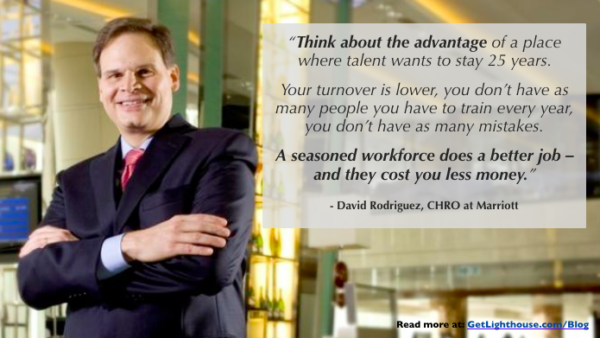
Promoting from within has challenges, too.
Having said that, promoting from within doesn't just magically work on its own. You have to work hard to make promoting from within successful.
Many companies fail at promoting from within, because they make critical mistakes including:
- Not providing enough training
- Not making it safe to say, "management isn't for me”
- Letting teams get too big to manage well
When you take over a new role, you need more support from your manager, not less. Yet, many senior leaders take their eyes of their new managers when they need them most.
That's exactly when you'd hear how they need more coaching, that they're overwhelmed by their team size, or they have realized they don't want to be a manager anymore. You won't know if you don't put in the effort to try to make them successful.
Those are just a few of the reasons that promoting from within can fail. To create more leaders in your organization the right way, read The Top 10 Reasons Companies Fail at Promoting from Within to find out how to keep from making the other common mistakes, and what to do instead.
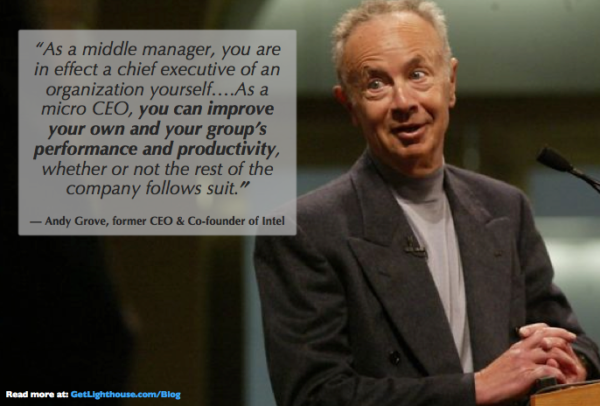
6) Embrace that people leave managers, not companies
In Gallup's "The State of the American Manager”, they found that over half of all Americans have left a job specifically to "get away from their manager at some point in their career.”
However, that's just the beginning. The same study found that managers account "for at least 70% of the variance in employee engagement” which affects all kinds of key factors important to your company like safety, sickness, profitability, and productivity:
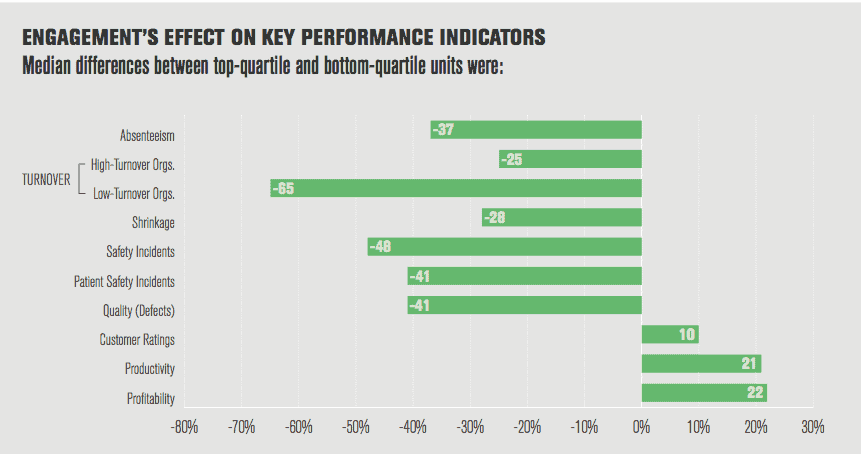
Given all the different ways managers contribute to the success or failure of the people on their teams, there are many less visible reasons why employees would leave.
As a manager, you are responsible for helping people grow in their role and at your company, creating psychological safety, coaching them through problems, and many more things that all affect someone's engagement and whether they decide to leave.
Put simply: People leave managers, not companies.
As you promote and hire managers, it's important you embrace this concept. One bad manager can lead to a whole wave of costly turnover, as Gallup's Cascade effect shows:
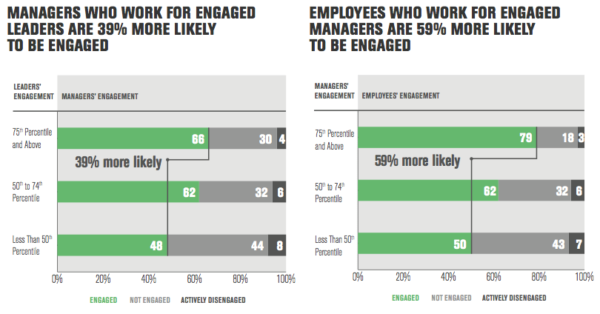
Further reading:
- Closely related: Why managers must become coaches
- And: Employee Coaching: Why it Matters and How to Become Great at It
- Learn how managers cause low employee morale on their teams.
7) Help your new leaders be successful
It's your job as their leader to help make your managers successful. This is especially true for your new managers who need your guidance more than ever (remember, they've just made a big-time career change).
Here are some of the most important ways you can do that:
- Give them more support through more frequent one on ones, not less often.
- Help them develop a strong foundation of good fundamentals, such as learning how to build rapport, ask questions, listen effectively, and have great, regular one on ones with their team, too.
- Give them the freedom to learn from their mistakes and coach them accordingly.
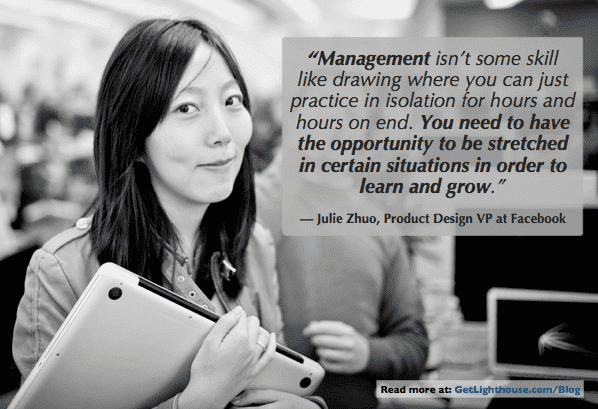
Most importantly, remember what it was like for you when you first became a manager. It's a bit jarring and requires a certain amount of patience and persistence, so be that encouraging voice in their corner ready, willing, and available to support them.
Further reading:
- To learn more about how to help your new managers start off right, read: How to Ensure a New Manager Succeeds.
- A great way to help your new managers develop the habit of continuous learning are books. Here are our favorites: The best leadership books for new leaders

Part 3: On mastering the fundamentals (and other tips)
Just because you're a senior leader now doesn't mean you're a master of the fundamentals of good leadership.
In fact, now that you're a senior leader, you need to revisit those fundamentals and double down on them. You need to understand why what you did worked, so you can teach others, and make sure you continue to lead by example with them.
And if you have any weaknesses, now is the time to work on them or mitigate them; the larger your organization gets, the more your strengths and weaknesses are amplified.
Whether on the sports field or in the office, a few key habits and mastery of the fundamentals can make all the difference. They give you a foundation to build you and your team's success on and an example for others to follow.
Here are some of those key management fundamentals to live and teach others in your organization:

8) Understand and master Task Relevant Maturity
Task Relevant Maturity is a concept that all senior leaders need to master.
It helps you know when to be hands-on, and when to trust your team and stay out of the way. It avoids problems where people are left to struggle and fail, as well as the dreaded frustration of having a micromanager.
Task Relevant Maturity (TRM) is defined by legendary co-founder and CEO of Intel, Andy Grove in High Output Management as:
"How often you monitor should not be based on what you believe your subordinate can do in general, but on his experience with a specific task and his prior performance with it – his task relevant maturity…
As the subordinate's work improves over time, you should respond with a corresponding reduction in the intensity of the monitoring.”
It's your job as their leader to understand everyone's task-relevant maturity so you know how to approach managing them well. Trust your best people with the work they're great at, and spend more time helping your people when they face new, challenging work.
Grove provided this handy table to help think through how to apply Task Relevant Maturity with your team:
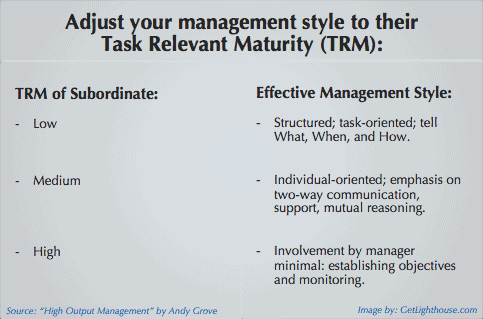
Without taking the time to properly understand Task Relevant Maturity, such as by promoting a new manager then being hands-off after they take their new role, you can set up your team for failure before they even start.
Over and over, I've heard stories of friends and customers tasked with new responsibilities and having an absentee manager. That's a recipe for struggle, frustration, and failure. Often, it also leads to turnover, as the employee leaves after that difficult experience.
It's critical you consider the Task Relevant Maturity of each of your managers based on their current role and task instead of assuming they'll figure it out on their own.
You also then need to teach the managers that report to you this concept so they do the same for their teams.
To learn more about Task Relevant Maturity, read:
- The Most Important Management Concept You're Missing: Task Relevant Maturity.
- How to apply Task Relevant Maturity to yourself
9) Become great at onboarding new team members
As our quote earlier from Andy Grove put so well, you might not have control of your entire organization, but you are in effect the CEO of your team.
One of the best examples of this is in how you onboard your new team members.
Having quality onboarding for new hires makes a big difference. Companies with great onboarding programs report 2.5X higher revenue and 1.9X better profit margins than those without:
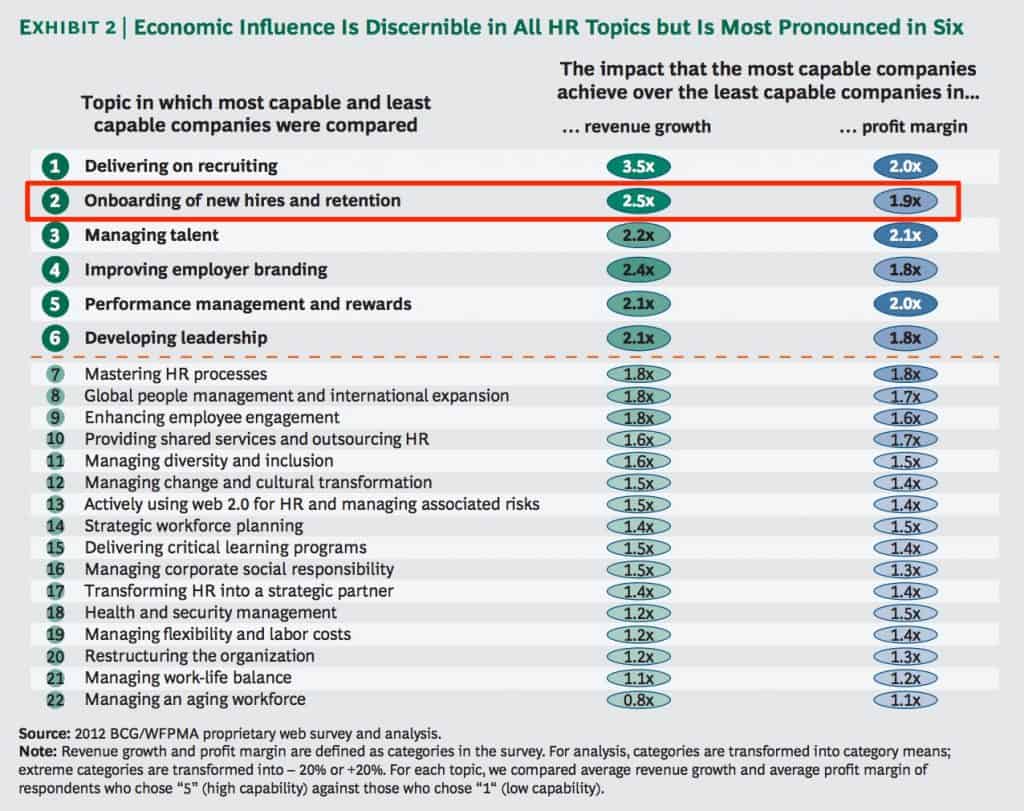
How you onboard new employees is up to you, but key habits like these can make sure your onboarding process is successful:
- Write out your onboarding process so you can reference, follow, and iterate on it.
- Ask key questions like: What do we give new hires to prepare and make them really feel welcome?
- Consider creating a buddy system to pair new hires with a colleague to show them around and be available for quick questions.
As the saying goes, "You don't get a second chance to make a first impression." Make sure your new hires have a good first impression on your teams, and not one of those "my laptop wasn't ready, I couldn't find the bathroom, and no one helped me" kinds of scenarios.
To learn more about improving your onboarding process, read: How to Improve Your Employee Onboarding Process to Engage Your Hires & Prevent Turnover.

10) Master getting buy-in
Buy-in isn't automatic just because you're the boss. In fact, that mindset is a great way to get a whole wave of resistance from your team members.
Any changes you want to make will almost always be met with some resistance. To master buy-in, you need to learn how to win people over and listen to their concerns.
Often, team members fear the consequences of failure or have specific concerns about how a change will impact them or their work. They can also be pretty happy and comfortable with the status quo.
You need to take the lead to encourage them to act. If you're asking them to do something, show them that you're willing to do it yourself and get your hands dirty first.
It also helps to do things like share the why behind a decision, listen to their feedback and concerns, and repeat yourself regularly.
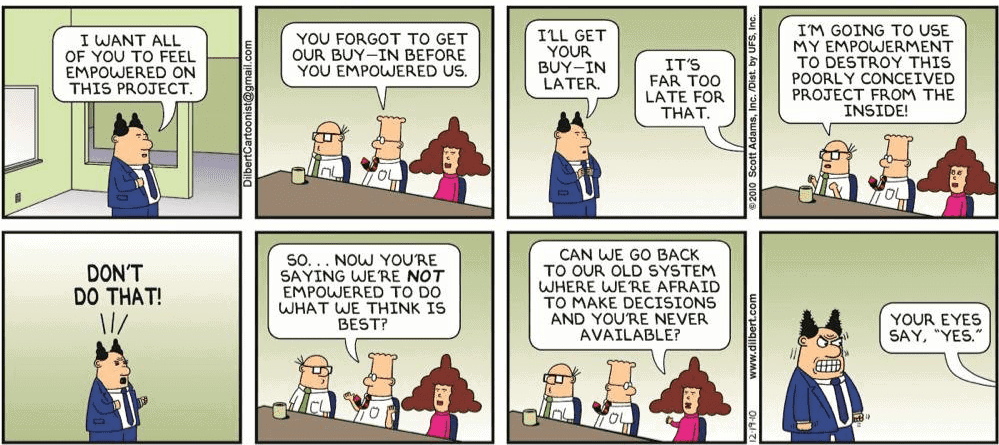
As much fun as it is to be the leader when you're winning, it's the challenging, sometimes unpopular decisions (layoffs, restructures, culture changes, new initiatives) that are the difference between success and failure.
Mastering getting buy-in is thus essential to you thriving as a leader that must influence so many others. Doing so makes it easier to convince them to support and work hard with you, even when moving in a new direction.
To learn more about mastering buy-in, read: How to Get Team Buy-in for an Important Change You Want to Make, learn about the Importance of the First Follower, and check out How to Get Buy-in at Work: a Step by Step Guide
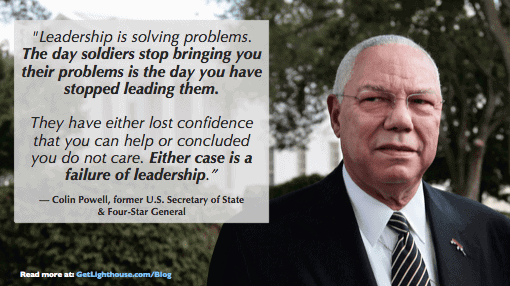
11) Seek regular feedback from your team
As a leader, feedback is critical. As Colin Powell reminds us, without feedback, you can't solve problems and may very well have lost your team.
Feedback helps you know if there's a growing problem on one of your teams, with a manager, between two employees, or on a project.
Feedback is priceless. If you truly listen, you'll hear valuable suggestions from your employees that could improve you, your managers, and the teams everyone works on. The source of your problems, and their solutions are often one healthy conversation away.
As a manager, a constant flow of feedback helps you do your job better. As a senior manager in charge of other managers, the importance of feedback is magnified several times over.

Here's what you can do to get more feedback regularly:
- Accept it graciously: How do you respond to feedback? Do you get defensive, shoot the messenger, and make the manager or employee question why they said anything? Are you scaring them into silence or providing a safe environment for them to bring up issues or ideas?
- Take action on that feedback: In addition to showing them that you're grateful for sharing their feedback, you need to take action on to show them that when they speak up, real change happens. Otherwise, they'll say to themselves, "Why bother?"
To learn more about getting feedback from your team, read: How you can get more feedback from your team.
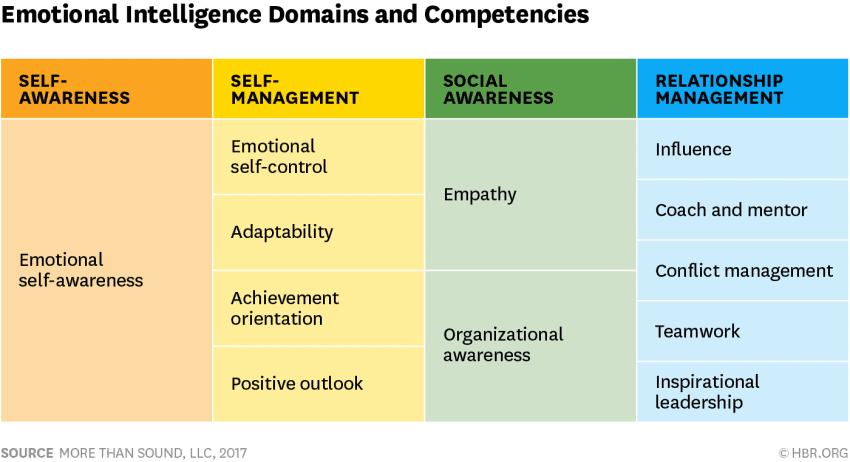
12) Develop your emotional intelligence (EQ)
Emotional intelligence is the single most important collection of skills a manager can have.
Management is the business of people, and we are much more than robots completing tasks. Developing a high emotional intelligence ensures you can connect, listen, coach, and understand everyone you work with.
Without it, you'll struggle greatly to identify issues and detect problems early. You're also unlikely to develop critical relationships with those in your department.
When you have high emotional intelligence, it becomes like a 6th sense and superpower for you:
- Sensing when there seems to be a problem you need to investigate.
- Knowing when someone isn't telling you the truth, or that you need to keep digging deeper in a discussion.
- Reading the room to know when your ideas or presentation is not going over well with your teams.
To start developing your emotional intelligence, use these tips:
- Practice mindfulness to develop your self-awareness
- Learn to accept feedback without getting defensive
- Use one on ones to develop your empathy and get to know your team members well
Keep in mind, that's just the tip of the iceberg. To learn more about improving your emotional intelligence, read: How to Improve Your Emotional Intelligence to Become a Better Leader.
More on mastering the fundamentals of Part 3:
- Learn the power of repetition to get your ideas across to everyone
- Be able to manage across generations by understanding each group's unique motivators
- Understand whether your managers are practicing key habits, by learning from Google's amazing workplace research

Part 4: Create a great culture for your organization
Culture is a topic with a ton of fluffy, empty ideas that miss the point of what culture is (and its purpose).
That can be a pain if you're trying to learn more about what culture really is and how to create a great one, as it's a key part of your job as a senior leader.
Remember, no matter what the culture of your company is, you still have the power to create the culture of your own team in many ways.
Here are tips related to creating a great company culture:

13) Create a great culture with the example you set every day
The key to a great work culture? Surprise– it's you.
In this great post on Medium, former Culture Manager of Facebook Molly Graham says that companies tend to reflect the qualities of their founders, for better or worse:
"Companies tend to reflect everything about them — their personality, strengths, weaknesses. So when you start defining culture in an intentional way, first look at yourselves.[…]
If a founder is competitive, the company will be more aggressive and competitive. If they are analytical and data-driven, the company will tend to make metrics-based decisions.”
This applies to you, too. As the "CEO” of your team, the team's culture will reflect your qualities in a similar way.

Here are a few tips for improving your team's culture, starting with you:
- Look for areas of improvement: Are there challenges you have that could be hurting your team culture? Do you see your team exhibiting behaviors you don't like?
- Live what you value: Your team doesn't always listen to what you say, but they pay close attention to what you do. Ask yourself: How do you live your values? When do you reinforce the values you say that matter by what you say & do?
- Be accountable: Taking responsibility for your actions and the results of your team is critical. If you won't be accountable, why would anyone else accept responsibility? No matter what happened, start by asking yourself how you contributed to problems you see, and what you could do differently.
To learn more about creating a great team culture, read these posts:
- The One Key to Building and Keeping a Great Company Culture.
- How to Change the Culture of Your Team.
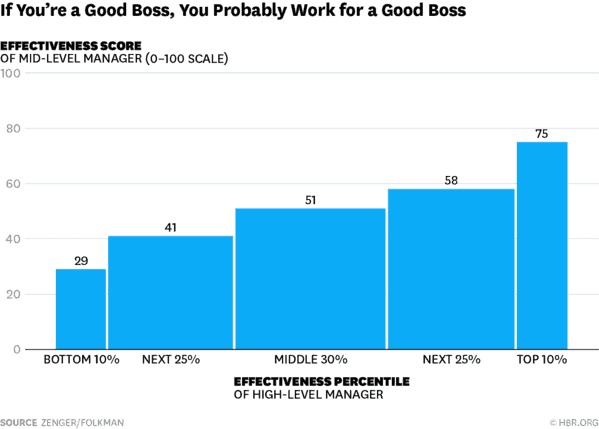
14) Avoid the pitfalls that create toxic work cultures
In an article from HBR, it was reported that great managers often make other great managers, while bad managers create more bad managers.
As the leader, your actions trickle down to create a lasting effect on the culture of your team.
In an article titled, "A Trickle-Down Model of Abusive Supervision”, the academic journal Personnel Psychology theorized that bad behavior on the part of upper management encourages middle and lower employees to act the same way:

Your behavior will be emulated by your managers and then be passed down to their employees. Even if you don't encourage a toxic work culture, if one of your managers is and you do nothing about it, it's going to affect their entire team.
Who you promote, what you reward, what gets punished, and what gets swept under the rug, all signal different things to your employees. Get any of those wrong and you're on your way to a ticking time bomb and a destructive culture. Just ask Uber, Zenefits, or Wells Fargo.
To learn more about how a toxic work culture can affect everyone in an organization, read: Toxic Culture: Why Wells Fargo Created Over 3 Million Fake Accounts and Hurt so many Americans.
Then, check out:
- How CEOs unintentionally wreck the culture of their companies (and how to fix it).
- Find out how culture change was key to the Chicago Cubs winning the World Series.
- Learn Why Silicon Valley has so many bad managers
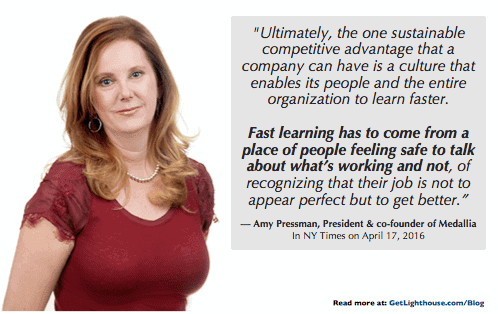
15) Foster psychological safety
According to research by Julia Rozovsky of Google, the best-performing teams have an environment where they feel safe and enthusiastic about sharing ideas and working through problems. In fact, an average team can beat a start-filled team because of it:
"Team A [is] filled with smart people, all optimized for peak individual efficiency. But the group's norms discourage equal speaking; there are few exchanges of the kind of personal information that lets teammates pick up on what people are feeling or leaving unsaid.
…In contrast, on Team B… all the team members speak as much as they need to. They are sensitive to one another's moods and share personal stories and emotions.
While Team B might not contain as many individual stars, the sum will be greater than its parts.”
Teams that had this psychological safety built were more likely to be successful on a project.
One of the best ways to promote psychological safety is to make it an essential part of your culture.
Find ways, like this playbook that Gallup's Jake Herway created for a client, that encourages participation and sharing without fear. Make sure your team knows that sharing is encouraged and doesn't threaten their job or role. No manager should ever "shoot the messenger" or criticize an idea simply because of who said it.
Here again, your example will go a long way toward establishing this in your group or department. Consider how your actions encourage or discourage sharing ideas, and how you can reward and recognize people for contributing their ideas that made an impact.
To learn more about promoting psychological safety on your team, read: Why You Should Prioritize Psychological Safety to have an Innovative Team.
More on creating a great company culture:
- How to change the culture of your team
- Lessons from Patty McCord of Netflix on company culture
- The unfiltered truth about creating great corporate culture from a variety of experts

Bonus point: Plan for the unexpected (Crisis leadership and COVID) - it's one of the most important senior manager skills
The 15 tips above form the critical foundation of what makes a great senior leader. However, part of being a leader, especially a senior leader who is a manager of managers, is handling the unexpected.
In recent years, the COVID pandemic and associated lockdowns challenged all of us in a way that few have ever experienced.
Except for a few very fortunate companies whose technology or services are needed more in a pandemic, everyone's sales numbers took a hit, all while dealing with everyone working remotely all of a sudden.
That's why we made sure to provide posts to specifically help leaders like you navigate the crisis (and any future ones):
- 31 Questions to Ask Remote Employees to Better Support Them
- Crisis Leadership: 18 Questions to Ask Your Team in a Crisis
- How to Help Your Team Avoid Employee Burnout during COVID
- How to Keep Your Team Happy and Motivated even in a Recession
While the challenges you faced then likely pushed you out of your comfort zone, and pushed decisions you may not have wanted to make, they're going to make you a better leader long term.
Even as COVID fades to the background, remote work appears here to stay. Remote was already becoming common before the pandemic hit, and many people have fled the cities with little desire to return given the aftermath there.
Remote management will be a valuable skill today and going forward, so these posts can help you keep developing these essential skills:
- 13 Things You Didn't Plan for When Hiring Remote Employees
- 5 Things You Didn't Expect When Managing Remote Teams (and what to do about it)
- 11 Essential Tips for Effectively Managing Remote Employees
Guide: How to Become a Senior Leader
As you grow from having managers to other senior leaders under you, you'll need to pass on more than just the knowledge of how to lead a team but how to be a manager of managers.
To that end, we created the below guide to help your aspiring senior leaders grow and give them a good place to start (or to help you if you're an aspiring senior leader):

Additional resources for senior leaders and development areas for senior leaders
If the resources above are a bit much to take in all at once right now, here are a few of our main recommendations for senior leaders like you, so you know where to start:
- Skip Level Meetings: Everything you need to know about Skip Level 1 on 1s
- Everything You Need to Know About Organizational Communication from the Experts
- Developing Leaders: What To Do When Your Team Grows Too Big
- The Power of Repetition: the Secret of Successful Leaders
- The Key to Great Culture on Your Team

Grow yourself and your leaders easily with Lighthouse Lessons
Developing your skills and those of the managers that report to you can easily slip on your to do list. Who has time to plan their own training and curriculum?
It can also be frustrating when you purchase training and you’re dumped way too much all at once on a boring Zoom, or all day seminar.
That’s why we created Lighthouse Lessons: Group Training.
We’ve taken a totally different approach that has helped thousands of managers like you level up more easily while learning the most important skills for leaders:
- Healthy Pace: You’ll get one highly actionable lesson per week that we teach you exactly how you can immediately apply so that you learn the concept by putting it into practice.
- Right Size: The lessons are bite-size, so even the busiest manager can handle it; each one only requires ~20 minutes for you to read and plan your action for the week.
- Group Bonding: To help groups of managers further their learning, leaders get a group discussion agenda so you can meet to talk about the lessons to build bonds, ask questions, and support each other…all with zero prep by you.
But don’t take our word for it. Here’s what Lisa Eckel, the Learning and Development Manager at Jornaya, a company that purchased 3 different Lighthouse Lessons programs for their managers, has said about the impact on her team:
"The Lighthouse Leadership Lessons program is great for new and experienced managers because the lessons can positively change the behavior of managers at any level.
Having various experience levels in our group was a help to newer managers as they were able to get thoughtful and practical guidance on real-world scenarios from their peers.”
We’ve helped groups of managers at companies ranging from 5 to over 250 managers learn new essential leadership skills, and we’d love to help you next.
Click here to see all the programs and sign up to discuss running a program at your company.





